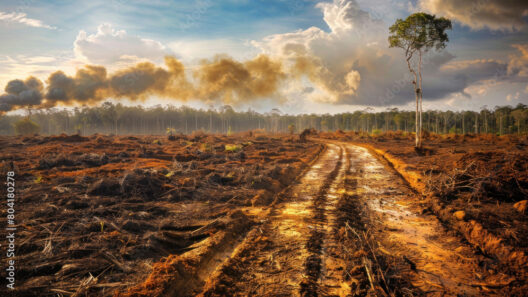In the vast theatre of climate change, corporations are akin to juggernauts, lumbering through the landscape, leaving behind indelible marks of consequence. Their operations orchestrate a complex symphony of emissions that crescendo into an unsettling harmony, driving global temperatures upward. This essay elucidates the ways in which corporations contribute to global warming, threading together their multifaceted impacts and the overarching implications for the environment.
Fundamentally, it is imperative to explore the emissions produced by corporate activity. The primary culprits in this scenario are greenhouse gases (GHGs) emitted during production processes, transportation, and consumption of goods. Carbon dioxide (CO2), methane (CH4), and nitrous oxide (N2O) stand as the trifecta of offenders. Manufacturing giants, by virtue of their scale, often generate emissions that can rival those of entire nations. For instance, steel production—a cornerstone of modern construction—releases significant CO2 primarily through the combustion of fossil fuels, an application of energy that is regrettably addicted to carbon-intensive sources.
The transportation sector, under corporate auspices, is another significant contributor to atmospheric degradation. Corporations move products across the globe, employing fleets of diesel trucks and freight ships that belch exhaust into the atmosphere. Logistics, a vital vein for global trade, ironically serves as a major artery for greenhouse gas emissions. The World Economic Forum posits that up to 30% of urban greenhouse emissions stem from logistics and transportation. The net effect translates into a warming planet, as persistent carbon emissions enhance the greenhouse effect, trapping heat in the environment.
Yet, one must not solely attribute the blame for emissions to fossil fuel consumption and transportation. The agricultural sector, often overlooked, merits scrutiny as a significant player in global warming. Corporations engaged in industrial agriculture are responsible for vast swaths of deforestation, contributing to carbon release from trees that would otherwise sequester CO2. The over-reliance on chemical fertilizers and livestock farming generates methane, a greenhouse gas with a potency 28 times greater than CO2 over a century. Through monoculture practices, these corporate entities diminish biodiversity, disrupt ecosystems, and exacerbate the climate crisis.
Another layer of complexity arises from the phenomenon of planned obsolescence. Many corporations engineer products to have a limited lifespan. This results in increased manufacturing rates to replace these products, creating a perpetual cycle that amplifies emissions. As consumers are compelled to discard and repurchase, landfills burgeon, releasing methane as organic materials decompose anaerobically. This vicious cycle encapsulates a corporate pursuit of profit, often at the expense of environmental sustainability.
Corporate lobbying further muddies the waters of climate accountability. Many influential industries wield significant political sway, investing heavily in lobbyists to prevent stringent climate regulations. This insidious influence perpetuates a status quo detrimental to sustainable practices. For instance, the fossil fuel industry has been known to finance campaigns against renewable energy initiatives. The repercussions are profound; necessary legislative actions that could mitigate climate change are stifled, allowing corporations to continue their fossil fuel dependence unabated.
The allure of corporate social responsibility (CSR) initiatives can paradoxically serve as a smokescreen for more insidious practices. While some companies tout environmentally friendly policies—such as carbon offsets or investments in renewable energy—these initiatives often serve as mere public relations maneuvers, diverting attention from their underlying carbon-intensive operations. Critics argue that these superficial efforts do not mitigate the extensive damage wrought by fossil fuel dependency and resource exploitation.
Additionally, the concept of “greenwashing” emerges, where companies exaggerate their environmental initiatives to appeal to the burgeoning green consumer market. This tactic obfuscates the real impact of corporate actions on the environment, creating a façade of sustainability while contributing to global warming through their core operations. As consumers are bombarded with messaging about eco-friendliness, it becomes paramount to sift through the layers and discern substantiated commitments from mere rhetoric.
A notable dimension of corporate contribution to global warming lies in the energy sector, where large corporations consume staggering amounts of energy, predominantly sourced from fossil fuels. The insatiable appetite for energy drives the proliferation of coal, oil, and gas extraction—processes that are intensely polluting and environmentally destructive. The combustion of these fuels not only releases vast quantities of CO2 but also contributes to air and water pollution, further complicating the ecological fabric of our planet.
Ultimately, the corporate landscape is being called upon to transition toward sustainable practices to mitigate its climate impact. The advent of renewable energy technologies presents an opportunity for corporations to rethink their energy consumption models. However, inertia often prevails in the face of profitability. The lingering question remains: can corporations transform themselves from instruments of destruction into agents of positive change? The answer lies in a paradigm shift—a merger of innovation, responsibility, and ethical engagement with communities, fostering sustainable practices that prioritize a viable future over fleeting profits.
In conclusion, the corporate role in climate change is profound and multifaceted, operating within a network of practices that collectively facilitate global warming. It is essential to unravel these connections, recognizing that every emission sparked by indifferent practices adds fuel to an already raging fire. A concerted effort towards accountability, innovation, and authentic sustainability is not only a moral imperative but the linchpin for a resilient future on this planet. Without such transformation, corporations risk not only their own survival but that of the very biosphere that sustains us all.








